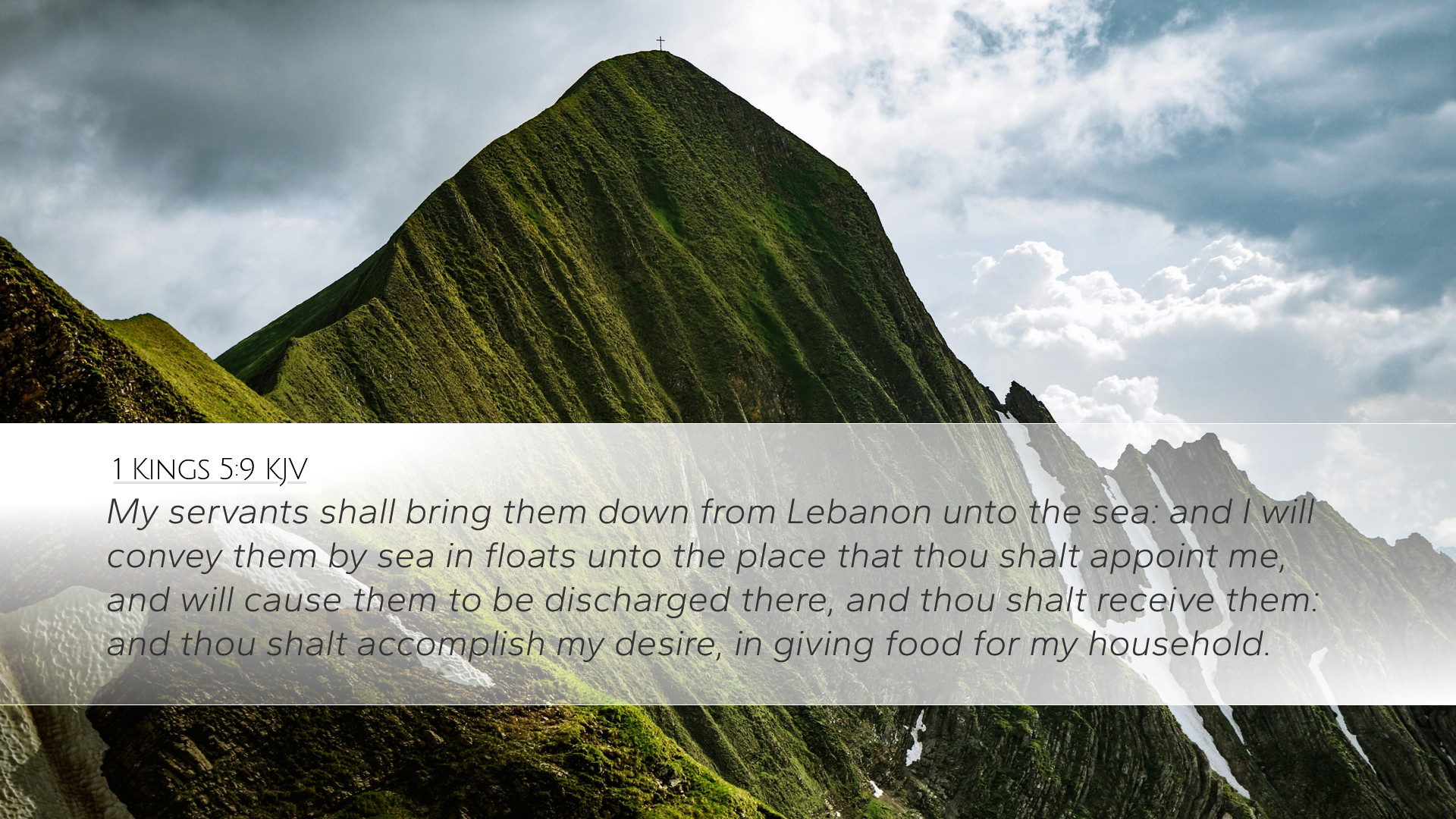Old Testament
Genesis Exodus Leviticus Numbers Deuteronomy Joshua Judges Ruth 1 Samuel 2 Samuel 1 Kings 2 Kings 1 Chronicles 2 Chronicles Ezra Nehemiah Esther Job Psalms Proverbs Ecclesiastes Song of Solomon Isaiah Jeremiah Lamentations Ezekiel Daniel Hosea Joel Amos Obadiah Jonah Micah Nahum Habakkuk Zephaniah Haggai Zechariah Malachi1 Kings 5:9
1 Kings 5:9 KJV
My servants shall bring them down from Lebanon unto the sea: and I will convey them by sea in floats unto the place that thou shalt appoint me, and will cause them to be discharged there, and thou shalt receive them: and thou shalt accomplish my desire, in giving food for my household.
1 Kings 5:9 Bible Commentary
Commentary on 1 Kings 5:9
1 Kings 5:9 states:
"My servants shall bring them down from Lebanon unto the sea: and I will convey them by sea in floats unto the place that thou shalt direct me: and will cause them to be discharged there, and thou shalt receive them; and thou shalt accomplish my desire, in giving food for my household."
Contextual Background
This verse comes in the context of Solomon's preparations to build the Temple in Jerusalem. It is crucial to understand the geopolitical and cultural background of the time, characterized by Solomon's alliances and trade relations with the Phoenicians, particularly Hiram, king of Tyre. Hiram plays a critical role in Solomon's plans by providing resources and labor.
Insights from Public Domain Commentaries
Matthew Henry’s Commentary
Matthew Henry highlights the cooperative nature of the work involving Solomon and Hiram. He emphasizes the importance of the materials sourced from the cedars of Lebanon which were renowned for their quality and durability. Henry comments on the logistic efforts required for transporting timber from Lebanon and notes that this act demonstrates Solomon’s commitment to the Temple’s construction.
Additionally, Henry points out that this collaboration signifies a deeper spiritual meaning. It reflects how God’s purposes are achieved through the unity of His people and their cooperation with one another. The phrase, “and I will convey them by sea in floats” illustrates the wisdom in Solomon's planning and execution, showing that God’s work is accomplished with forethought and prudence.
Albert Barnes’ Commentary
Albert Barnes delves deeper into the logistics mentioned in the verse. He notes that Solomon’s plan to use floats for transporting timber suggests a well-established maritime operation, which was sophisticated for its time. He explains that the “floats” likely refer to large rafts or ships that were used to carry the heavy timber across the Mediterranean Sea to reach Jerusalem.
Barnes further emphasizes the role of Hiram, as not only a king of Tyre but as an ally to Solomon. This relationship is critical, as it illustrates the diplomacy and mutual benefits that underline the construction of the Temple. By establishing such partnerships, Solomon is not only building a physical structure but also fostering inter-national relationships which are beneficial for trade and peace.
Adam Clarke’s Commentary
Adam Clarke brings attention to the economic implications of this venture. He points out the immense costs associated with such large-scale construction projects, highlighting that Solomon’s willingness to transport goods in such a manner signifies the wealth of the nation and the scale of the undertaking.
Clarke also notes the symbolic significance of the Temple in Jewish worship. The Temple represented God’s presence among His people, and its construction was not merely a physical endeavor, but a profound theological statement regarding God’s covenant with Israel.
Theological Reflections
In observing the multifaceted collaboration between Solomon and Hiram, readers are reminded of the church’s call to unity and cooperation in fulfilling divine missions. Here, we see practical wisdom in leadership, planning, and resource management, which are essential for any minister or leader in today’s church settings.
The logistics of construction can be seen as an analogy for spiritual growth and development. Just as Solomon planned meticulously for the Temple, so too must contemporary believers and leaders plan for the building up of the church, in order to foster an environment conducive to worship and edification.
Conclusion
1 Kings 5:9 illustrates the intricate balance between divine purpose and human action. The successful construction of the Temple is representative not only of Solomon's dedication but also of God's overarching plan for His people. Scholars, pastors, and students of the Word are encouraged to view this passage not merely as a historical account, but as a continuing call to excellence, teamwork, and reliance on divine provision in all pursuits of faith.


